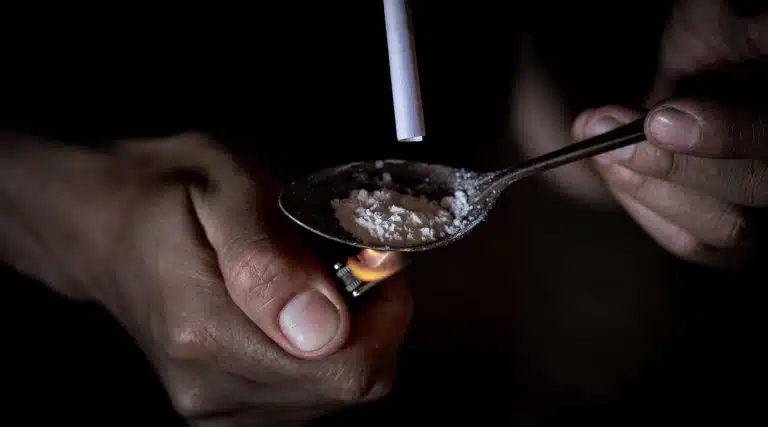Freebasing Cocaine | Effects & Dangers Of Smoking Cocaine

There is no safe way to use cocaine. Whether the drug is sniffed, snorted, injected, or smoked, cocaine is habit-forming and dangerous.
Smoking cocaine is a harmful way of drug abuse because smoking increases cocaine’s potency and addictive potential. It can also cause significant harm to the lungs and breathing over time.
What Is Freebase Cocaine?
Most illicit cocaine bought and sold on the street in the United States comes in the form of cocaine hydrochloride, or a white powder. Cocaine hydrochloride has a boiling point of around 356 °F, which is hot enough to destroy the drug before it can be inhaled to affect the body.
Freebasing is the process of removing or freeing the alkaloid ‘base’ cocaine from the hydrochloride salt, removing impurities, and concentrating the drug to lower its boiling point to only 176 °F, which is low enough to be smoked.
Early on, this freebasing process involved ammonia and an explosive form of ether. But around the 1970s, crack cocaine became a more popular alternative as it is far safer and easier to produce.
What Is Crack Cocaine?
Crack is made by modifying cocaine hydrochloride with baking soda (sodium bicarbonate). Crack cocaine comes in white-colored crystallized chunks, nuggets, or rocks.
It gets its name from the cracking and popping noises crack cocaine crystals make when heated, usually in a glass pipe.
Is Freebasing Cocaine The Same As Smoking Crack?
Freebasing refers to any process that purifies a drug and increases its potency. However, the term is used to describe smoking drugs in general, including smoking crack cocaine.
Short-Term Effects Of Smoking Cocaine
Any form of cocaine use puts intense stress on the body, mind, and heart, and its stimulating effects are strong enough that cocaine use can cause sudden death from strokes, cardiac arrest, or seizures.
Short-term physical side effects of smoking cocaine include:
- abdominal pain
- burned, cracked, or blistered lips (“crack lip”)
- constricted blood vessels
- dilated pupils and bloodshot eyes (“cocaine eyes”)
- elevated blood pressure
- elevated body temperature
- headaches
- increased or irregular heart rate
- muscle twitches
- nausea
- tremors
- vertigo
Long-Term Health Risks Of Smoking Cocaine
Using cocaine by any method outside a medical environment is drug abuse and puts the body at risk. Long-term health effects of smoking cocaine can include:
Binging & Crashing
Once the effects of cocaine wear off you will likely experience a long, drawn-out comedown or crash that can leave you feeling paranoid, miserable, and exhausted. Many who use cocaine will try to avoid this crash by taking repeated doses, sometimes for days at a time.
But, a cocaine binge puts the body under intense stress and can expose you to dangerous symptoms of exhaustion, malnourishment, and psychosis.
Lung Damage
‘Crack lung’ describes the worrying physical harm that toxic cocaine vapors can have on the lungs and breathing performance.
You may experience difficulty breathing, coughing fits, fevers, fluid buildup in the lungs, or you may even cough up blood due to hemorrhages/bleeding inside the lungs.
Heart Problems
Smoking cocaine puts stress on the heart, leading to long-term cardiovascular problems. This may include elevated blood pressure, arrhythmia (irregular or elevated heart rate), chest pain, heart attack, stroke, and congestive heart failure.
Brain & Nervous System Damage
Long-term cocaine use can damage brain functions including decision making, memory, and motor control, and may lead to the development of Parkinson’s disease.
Overdose
Cocaine overdoses involve both physical and psychological symptoms, which may include:
- anxiety
- chest pain
- delirium
- elevated heart rate
- hyperventilation
- fever
- nausea and vomiting
- panic
- paranoia
- tremors/seizures
Cocaine overdoses can be fatal or cause permanent harm and disability. If you suspect one has occurred, summon emergency medical care immediately.
Addiction
As with injection, smoking cocaine delivers a very high dose of the drug directly into the bloodstream, heightening its effects and increasing the likelihood of cravings and addiction.
Cocaine Addiction Treatment
Breaking free from cocaine addiction and overcoming withdrawal symptoms on your own can be challenging. Fortunately, professional substance abuse treatment is available to help you overcome cocaine abuse and live a more fulfilling life.
To learn more about our treatment programs, please contact Ark Behavioral Health today.
Written by Ark Behavioral Health Editorial Team
©2024 Ark National Holdings, LLC. | All Rights Reserved.
This page does not provide medical advice.
National Drug Intelligence Center - Crack Cocaine Fast Facts
National Institute on Drug Abuse - What is Cocaine?
U.S. National Library of Medicine: MedlinePlus - Substance use - cocaine

Questions About Treatment?
Ark Behavioral Health offers 100% confidential substance abuse assessment and treatment placement tailored to your individual needs. Achieve long-term recovery.
100% confidential. We respect your privacy.
Prefer Texting?
Our friendly support team is here to chat 24/7. Opt out any time.







 Learn More
Learn More








